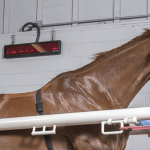Kentucky Equine Research Presents Findings at Equine Science Society Symposium

Kentucky Equine Research presented some of its most recent research at the Equine Science Society Symposium, held June 6-9, in Grapevine, Texas, and hosted by Texas A&M University. The six papers presented at this year’s symposium by Kentucky Equine Research build on a strong tradition of published research.
Joe Pagan, Ph.D., founder and president of Kentucky Equine Research, presented the lion’s share of the research, including:
Titration of GLA Supplementation Is Linearly Related to Incorporation of DGLA into Equine Red Blood Cells, a study that set out to determine how varied levels of supplemental gamma-linolenic acid, an omage-6 fatty acid, influence the equine blood fatty acid profile.
The Equine Blood Fatty Acid Profile and Clearance Rate of Supplemented Fatty Acids, a study designed to evaluate baseline fatty acid profile in horses fed varied diets without fatty acid supplementation for six months.
Type of Polyunsaturated Fatty Acid Supplementation Affects Red Blood Cell Fatty Acid Composition in Exercised Thoroughbreds, a study conducted to determine the effect of feeding different chain length omega-3 and omega-6 polyunsaturated fatty acids on red blood cell fatty acid composition in exercised horses.
Kentucky Equine Research has studied the growth of horses for decades, often using data from multiple continents to better understand how certain factors influence development of young horses. This data continues to serve producers worldwide as the basis for Gro-Trac, growth-tracking software developed by the company more than 25 years ago. Two more studies, both presented at the symposium by Pagan, added to this understanding:
Factors Affecting Birth Weight in Thoroughbred Foals Born in Kentucky, United Kingdom, a study conducted to evaluate how foal body weight is affected by gender, mare age, parity, month of birth, and geographic location. Parity refers to the number of times mare has given birth.
Relationship Between Age, Gender, Height, Body Condition Score, and Body Weight in Thoroughbred Yearlings Raised in Kentucky, a study that evaluated the relationship between age, gender, wither height, body condition score, and body weight in a large group of yearlings raised in central Kentucky over a 17-year period (2002–2018).
The final presentation was given by Ashley Fowler, Ph.D., director of research at Kentucky Equine Research:
Digestibility and Glycemic Response of Timothy-Based Haylage and Timothy Grass Hay, a study designed to determine if there were differences in digestibility and glycemic response between hay and haylage of similar quality.
Kentucky Equine Research employees Catherine Whitehouse, M.S., and Ryon Springer, M.S., also presented research at the symposium. This work was conducted to satisfy requirements for advanced degrees at their respective universities and not specifically affiliated with Kentucky Equine Research’s research program. Whitehouse is pursuing a doctorate at the University of Kentucky in equine nutrition and serves as a liaison between Kentucky Equine Research and its international network of feed manufacturers, while Springer recently finished his master’s degree and works as a research coordinator for the company at its Florida location.
Though not presenters, other nutritionists from Kentucky Equine Research attended the event, including Kathleen Crandell, Ph.D., and Katie Young, Ph.D. David Nash, director of nutrition technology at Kentucky Equine Research, who normally maintains an office in Australia, also attended.
The Equine Science Society promotes quality research in many fields of study and establishes effective communication among researchers, teachers, extension, and production personnel. The society’s signature event is its biennial symposium, which features professionals and students from multiple countries, many of whom report the latest scientific advances. Kentucky Equine Research has contributed to nearly every symposium since it opened 35 years ago.








